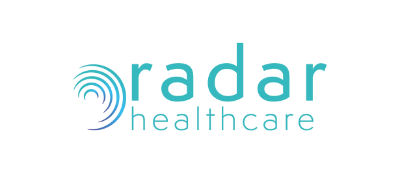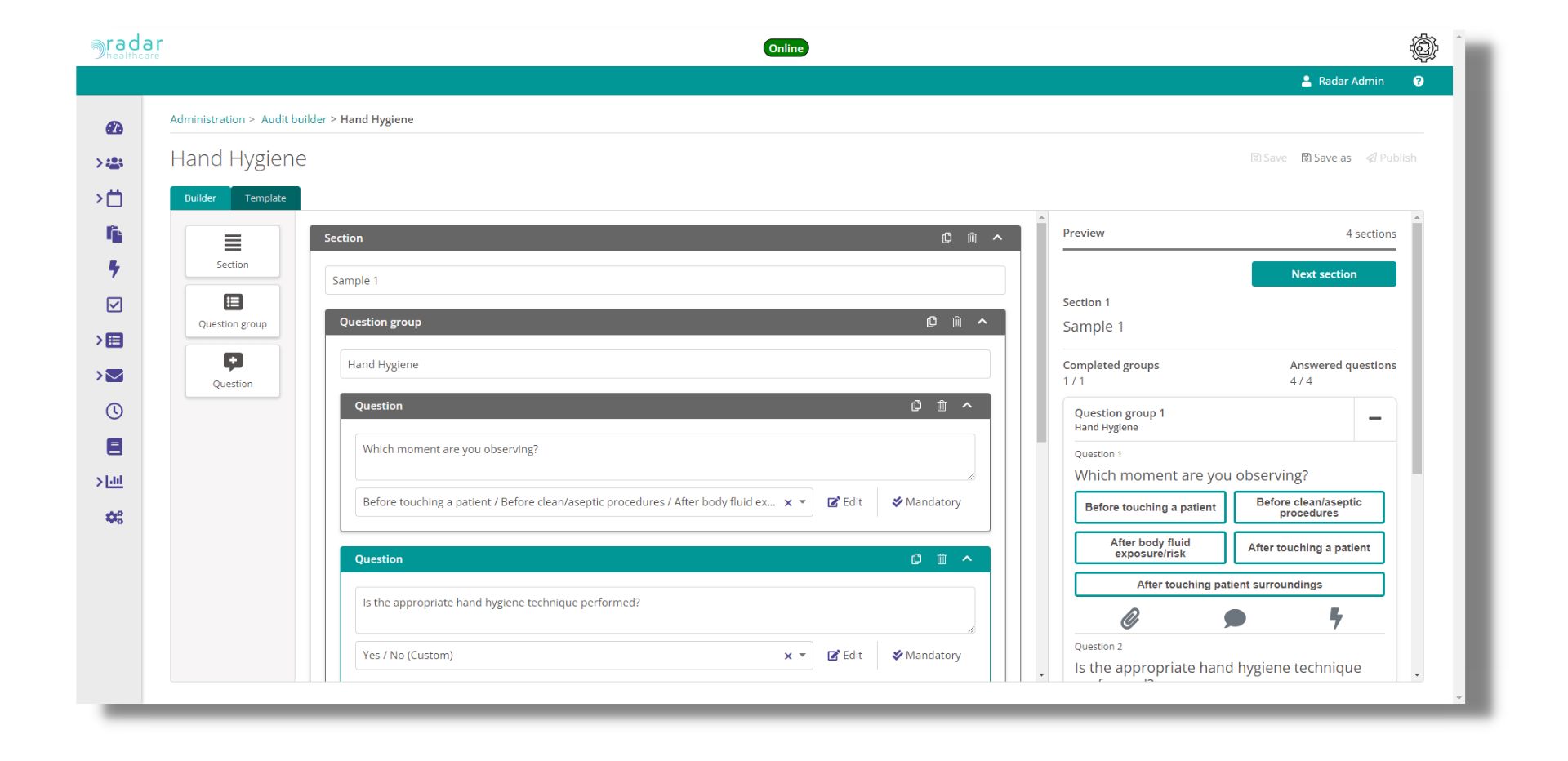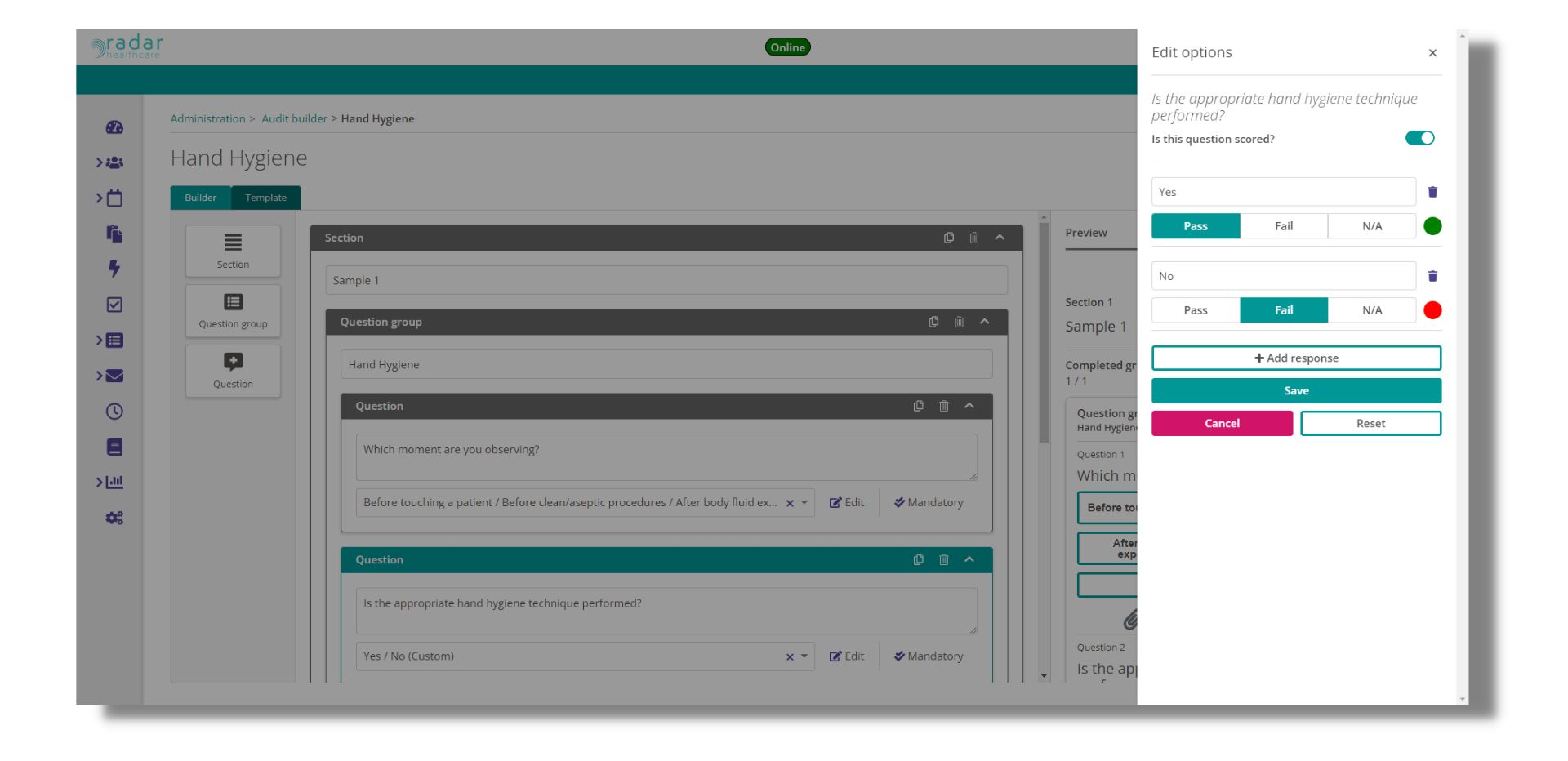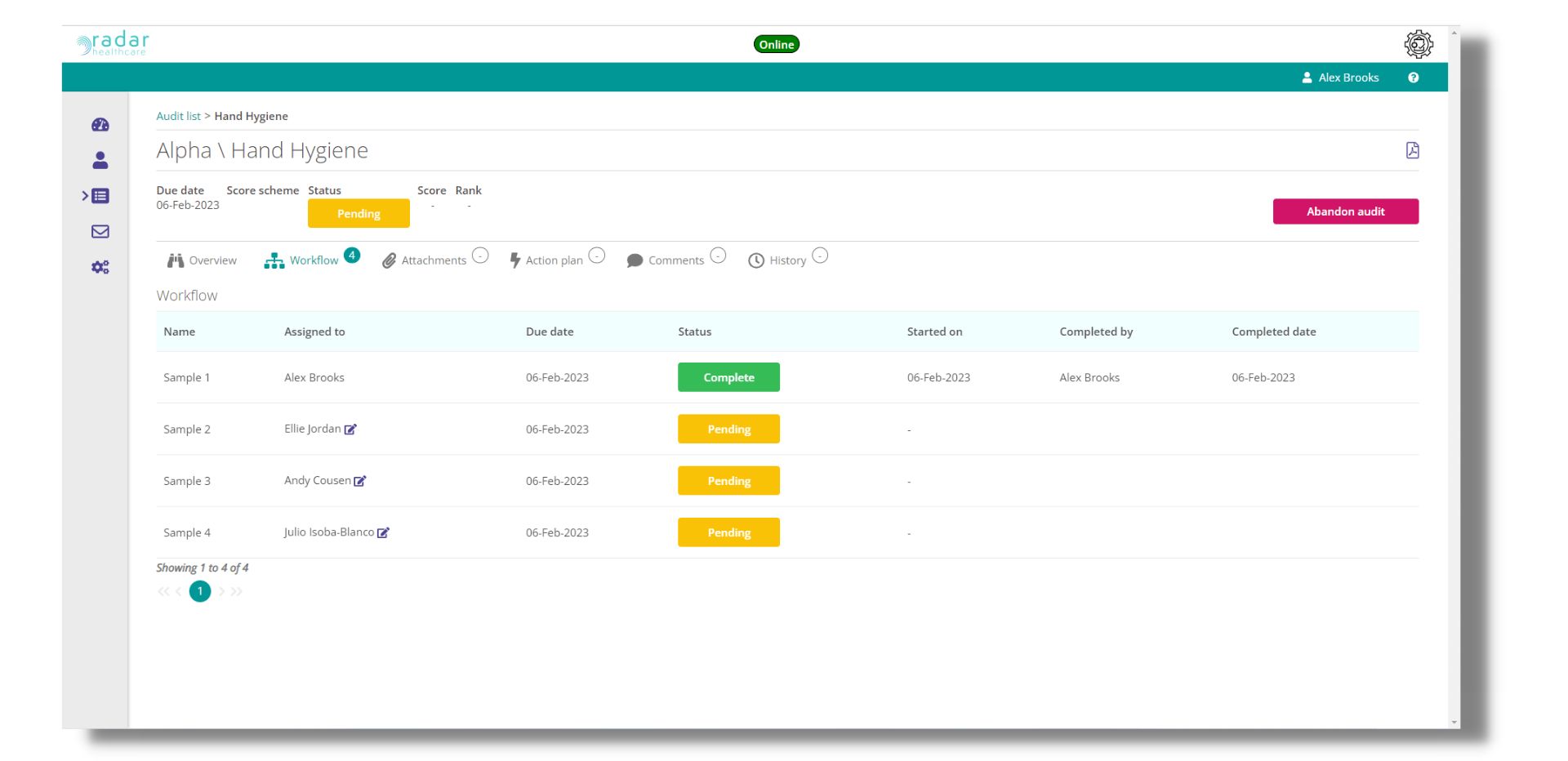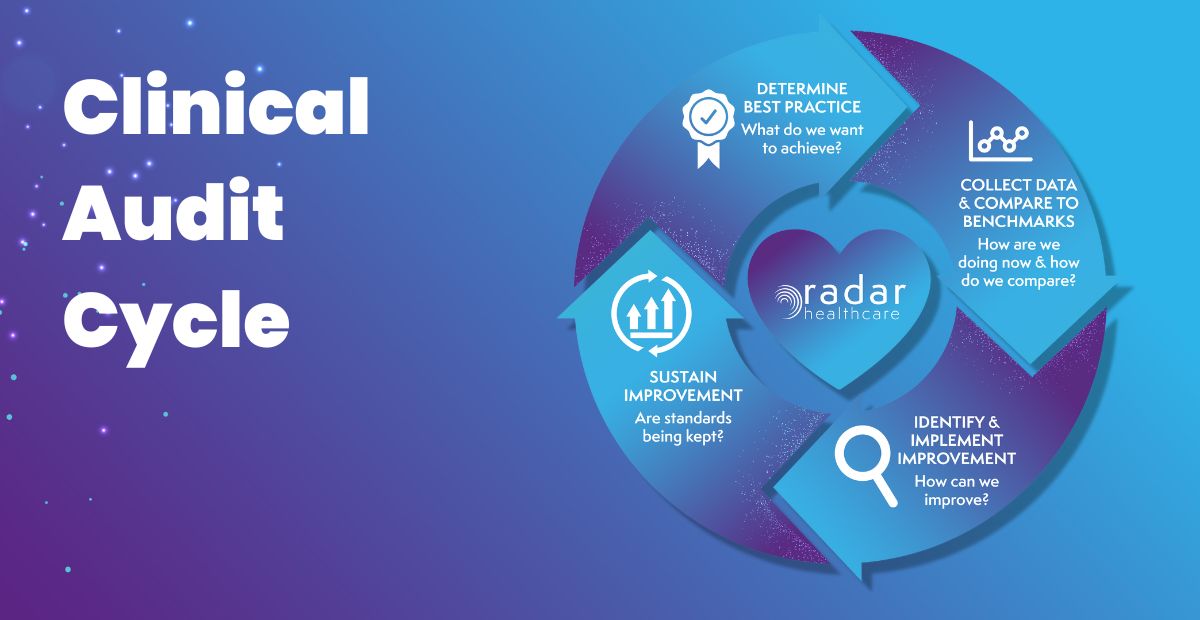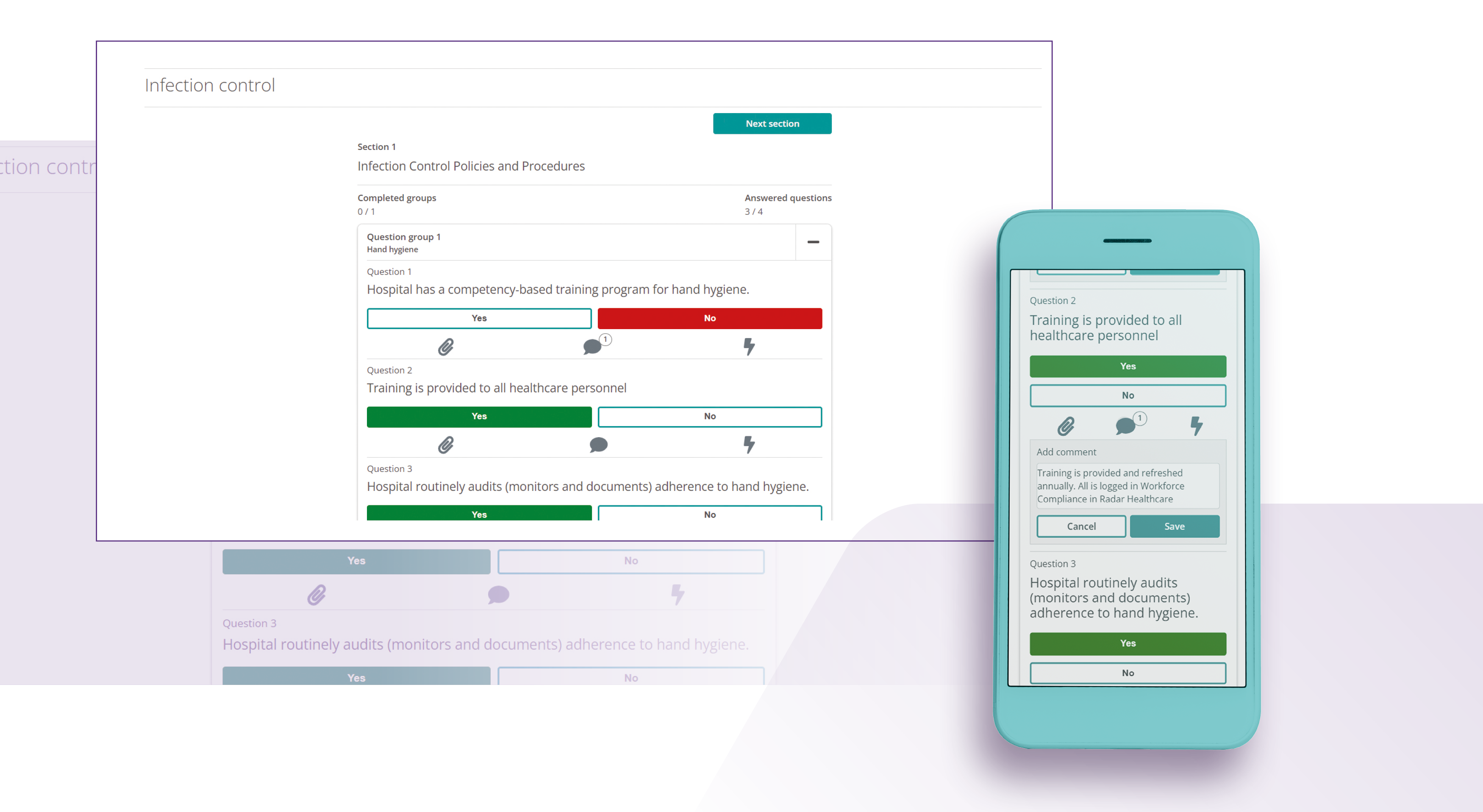Clinical Audit Examples and Tools for Quality Improvement
01 April 2024
Tags:
Clinical audits are an essential part of quality improvement in patient care. They measure the performance of various aspects of the clinical world to ensure that standards are being kept. In any areas that may not be up to scratch, there must be a structured process to bring about improvements. But how can you ensure that best practices are being followed and that technology is empowering healthcare professionals to improve care outcomes?
Did you know: you can create audits in Radar Healthcare and make scheduling and conducting clinical audits easier? Visit our Audit Management page for more information.
Read on for frequently asked questions surrounding clinical audits, a breakdown of the different types of clinical audits, and we also share an example of a hand hygiene audit being carried out using our software.
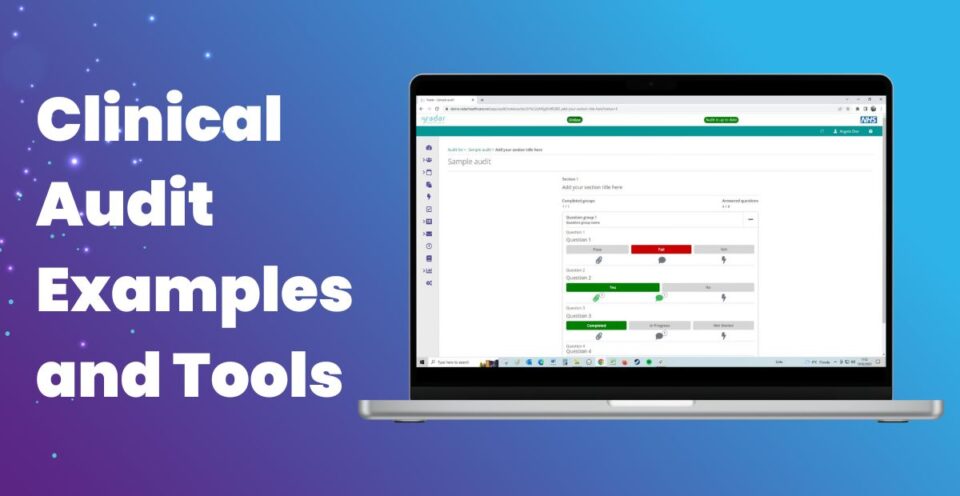
Quick links ⬇️
📋 Clinical audit FAQs
📝 Clinical audit definition
📊 Types of clinical audits
🔍 How to conduct a clinical audit effectively
🧼 Example of hand hygiene compliance audit
Clinical audit FAQs
A clinical audit is a structured review process aimed at evaluating healthcare quality and effectiveness. It’s all about enhancing patient care by pinpointing areas for improvement and implementing evidence-based changes. Through meticulous data analysis, healthcare professionals identify strengths and weaknesses in clinical practices, fostering a culture of continuous improvement.
Clinical audits are crucial for maintaining and improving the quality of healthcare services. They help identify gaps in care, enhance patient safety, and ensure that medical practices align with established standards and guidelines.
Examples of clinical audit topics include medication safety, infection control, patient satisfaction, adherence to clinical guidelines, and the efficiency of healthcare processes. Here’s some further detail on the various types of clinical audits our partners carry out via our Audits module:
Medication Safety:
This audit focuses on ensuring the safe prescribing, dispensing, and administration of medications. It may include assessing proper documentation, verification processes, and staff training to prevent medication errors and adverse reactions.
Infection Control:
Audits related to infection control aim to evaluate the effectiveness of practices to prevent and manage infections within healthcare settings. This could involve assessing hand hygiene protocols, cleanliness of medical equipment, and compliance with isolation precautions. Read on for an example of a hand hygiene audit being carried out in Radar Healthcare.
Patient Satisfaction:
Measuring patient satisfaction is crucial for assessing the overall quality of healthcare services. This audit involves gathering feedback from patients regarding their experiences with healthcare providers, facilities, and communication, helping identify areas for improvement. We are able to facilitate this via external feedback forms.
Adherence to Clinical Guidelines:
Clinical guidelines are established protocols for managing specific health conditions. Audits in this category assess how well healthcare providers adhere to these guidelines in their decision-making and treatment plans, ensuring evidence-based practices.
Efficiency of Healthcare Processes:
Efficiency audits focus on optimising the workflow and processes within healthcare organisations. This may involve evaluating appointment scheduling, patient flow, use of resources, and overall operational efficiency to enhance the delivery of care.
Diagnostic Accuracy:
Ensuring accurate and timely diagnoses is critical in healthcare. Audits in this area may assess the diagnostic process, including the appropriateness of tests ordered, the accuracy of diagnoses, and the communication of results to patients.
Patient Safety Incidents:
This type of audit involves reviewing incidents related to patient safety, such as falls, pressure ulcers, or other adverse events. The goal is to identify contributing factors, analyse root causes, and implement measures to prevent future occurrences.
Compliance with Regulatory Standards:
Healthcare organisations must comply with various regulatory standards and requirements. Audits in this category assess the organisation’s adherence to these standards, ensuring legal and ethical practices in patient care.
Continuity of Care:
Audits related to continuity of care assess how well healthcare providers coordinate and communicate during transitions of care, such as patient transfers between departments or from hospital to home care.
Resource Utilisation:
This audit evaluates the efficient use of resources, including staff time, equipment, and facilities. It aims to identify areas where resources can be optimised to improve overall healthcare delivery.
Each of these clinical audit topics addresses a specific aspect of healthcare delivery, contributing to the overarching goal of continuous quality improvement and patient safety. Choosing the right audit topic depends on the priorities and goals of the healthcare organisation.
Conducting a clinical audit involves defining objectives, selecting criteria and standards, collecting and analysing data, implementing changes based on findings, and monitoring the impact of those changes. It is a cyclical process aimed at continuous improvement.
Conducting a clinical audit is made more streamlined and efficient with Radar Healthcare’s comprehensive support and tools
Our software offers an intuitive Audit Builder, allowing healthcare professionals to easily create, customise, and manage audit templates. With features such as Sections, Question Groups, and customisable Response Types, users can structure audits according to specific organisational needs.
The drag-and-drop interface simplifies the audit-building process, while mandatory options ensure thorough data collection. The platform’s Preview and Publishing features enable real-time evaluation and seamless deployment of audit templates.
With the flexibility to update existing templates, our audits module ensures that organisations can continually refine their clinical audit processes for ongoing improvement, contributing to enhanced patient care and adherence to quality standards.
Common challenges include data collection issues, resistance to change, lack of resources, and difficulty in engaging stakeholders. Overcoming these challenges requires careful planning, effective communication, and a commitment to improvement.
Yes, various templates and tools are available to assist in the clinical audit process. These templates often include sections for defining objectives, data collection, analysis, and action plans. Healthcare organisations and professional bodies may provide specific templates.
Radar Healthcare provides flexibility with audit template Creation
Within our audits module you’ll find the Audit Builder which allows users to create and update audits anytime. You can easily view existing audit templates, search for specific ones, and create new templates from scratch to meet the auditing needs of your organisation.
Sharing clinical audit results promotes transparency, encourages a culture of continuous improvement, and facilitates learning from both successful practices and areas needing enhancement. It also fosters collaboration among healthcare professionals.
The frequency of clinical audits can vary based on organisational needs and priorities. However, they are typically conducted regularly, such as annually or biennially, to ensure ongoing monitoring and improvement of healthcare practices.
Radar Healthcare facilitates a flexible approach to scheduling audits
With our Enhanced Audits and Schedule Audit options, users can create unique schedules tailored to their specific requirements. The scheduling process is intuitive, allowing easy selection of the audit, determination of the frequency, and assignment of locations and auditors.
What sets Radar Healthcare apart is its sophisticated ‘pending period’ feature, which notifies users of upcoming audits within a pre-determined timeframe before the due date. This ensures proactive preparation and timely completion. Users can customise the pending period based on their preferences, allowing audits to be completed efficiently and in compliance with established timelines.
With the ability to create, customise, and manage audit schedules seamlessly, Radar Healthcare empowers healthcare professionals to conduct audits at the right frequency, fostering a culture of continuous improvement.
Clinical audits are generally intended for quality improvement rather than punitive measures. However, if serious issues or non-compliance with standards are identified, appropriate actions may be taken to address the root causes and prevent future occurrences.
Healthcare professionals actively participate in clinical audits by providing input, contributing data, and implementing changes based on audit findings. Their engagement is crucial for the success of the audit process and with the ultimate end goal of improving patient care.
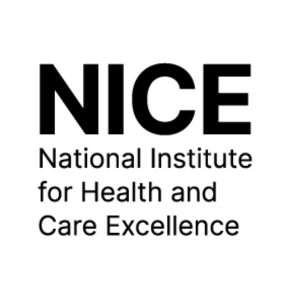 Clinical audit definition
Clinical audit definition
According to the National Institute for Health and Care Excellence (NICE) 2002, they define clinical audits as:
“A clinical audit is a quality improvement process that seeks to improve patient care and outcomes through systematic review of care against explicit criteria and the implementation of change.
Aspects of the structure, processes, and outcomes of care are selected and systematically evaluated against explicit criteria. Where indicated, changes are implemented at an individual, team, or service level and further monitoring is used to confirm improvement in healthcare delivery.”
Types of clinical audits
As a healthcare professional, it’s your job to ensure that your patients are receiving the best possible care. That’s where clinical audits come in. The National Health Service (NHS) conducts various types of clinical audits to evaluate and improve the quality of healthcare services provided to patients.
These audits are an essential tool to ensure best practices are being followed. Here are some examples of clinical audits done in the NHS to achieve this goal:
These audits are organised by the Healthcare Quality Improvement Partnership (HQIP) and cover a range of clinical areas, such as cancer, cardiovascular disease, and mental health. They are aimed at improving patient outcomes, reducing variation in care, and identifying areas for improvement.
These audits are conducted at the local level by individual NHS trusts and hospitals to assess the quality of care provided to patients within their own organisation. They are often used to identify specific areas for improvement and implement changes to improve patient care.
These audits focus on a specific clinical specialty, such as ophthalmology, dermatology, or obstetrics. They are conducted by specialty societies or groups of clinicians who have an interest in improving the quality of care within their field.
These audits focus on identifying and addressing potential risks to patient safety, such as medication errors, hospital-acquired infections, and falls. They are often conducted in collaboration with patient safety organisations and patient representatives.
These audits are part of the overall system of clinical governance within the NHS, which aims to ensure that high-quality care is provided to patients. They assess the quality of clinical services, identify areas for improvement, and ensure that appropriate action is taken to improve patient care.
Overall, clinical audits are an important tool for improving the quality of healthcare services provided by the NHS and ensuring that patients receive safe and effective care.
Our advice? Use intelligent software that brings all of this together, across multiple locations so you can gain complete oversight, using Radar Healthcare’s product modules.
“Since implementing Radar Healthcare’s audits module, we've achieved nearly 100% audit completion and identified areas for improvement in 30% of cases. This newfound visibility has allowed us to aggregate insights across our organisation and support individual service managers in driving positive change. Overall, our experience with Radar Healthcare's audits module has been incredibly positive, and we look forward to continuing our journey of learning and improvement with this powerful tool.”

Don’t let your audits work in silo
Integrate your existing quality and compliance processes with your audits so that everything’s in one place. Link to action and improvement plans, analytics, and even third-party systems from workforce management and EPRs to ensure nothing is missed and that you can spot performance trends quickly.
Wondering if our audits management tool would work for you? Book a demo with one of our experts.
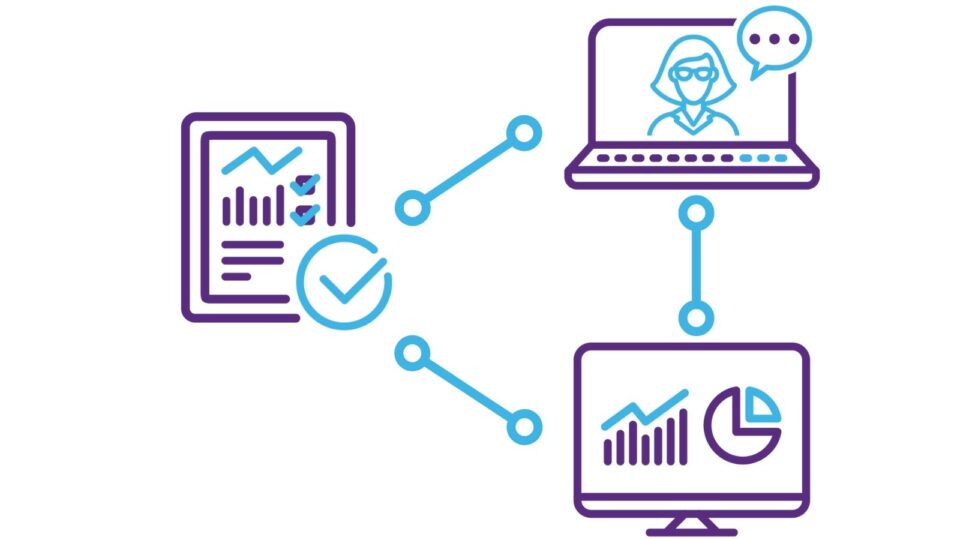
"Radar Healthcare’s audits module is a game changer! We are really impressed with how flexible and easy it is to create templates and duplicate questions. We LOVE the ability to reassign each section - this will save our teams a huge amount of time when building and completing audits."
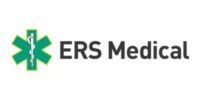
How to conduct a clinical audit effectively
Analyse – Gain oversight
Want to know what your top ten failed questions are and where you can make most of a difference? Do you want to know where your teams should spend their time to drive positive change and outcomes?
With Radar Healthcare’s analytics dashboard, complete the reports you need on a regular basis, whether locally or nationally, and let the AI and machine-learning do all the hard work for you, alerting you of KPIs in real time so you can easily act and improve patient safety and quality of care.
Action plans – Drive organisational learning
Share the audit results with your relevant stakeholders, including clinical teams, service users, and management, and develop an action plan to address any issues identified through Radar Healthcare’s audit management tool.
Schedule audits (re-audit) – Complete regular checks
Revaluate the impact of any changes made based on previous audit results and action plans you’ve put in place. Embed the audit process into routine clinical practice and promote a culture of continuous quality improvement using our other modules. Use the results and the action plan to address any areas for improvement, such as providing additional training using Radar Healthcare’s workforce and document management modules.
Example of hand hygiene compliance audit
Auditing doesn’t have to be difficult, with modern AI-driven software like Radar Healthcare, you can carry out clinical audits digitally so that it’s easy to track progress, make improvements and refer back to historical audits when the need arises.
As shown by this hand hygiene audits example, you can include questions in which there is a set response type of ‘Pass,’ ‘Fail,’ or ‘NA’ but it won’t be included in the score of your audit.
When your staff are completing the audit, it’s easy for them to click their answer, and upload any supporting evidence in the form of images or documents.
You can also preview the audit in real-time before publishing live. There’s also the option to integrate an action plan as you go, based on the response. For instance, if the auditor answers ‘Fail’ to that particular question, they can build an action and improvement plan instantaneously.
Radar Healthcare supports all healthcare audits, with clinical just being one type.
Below is an example of what your audit list can look like, where you can see the status of audits and their results in one place. If a score isn’t as expected, Radar Healthcare will alert relevant staff to begin the necessary action plan to bring scores and therefore the quality of care back up.
